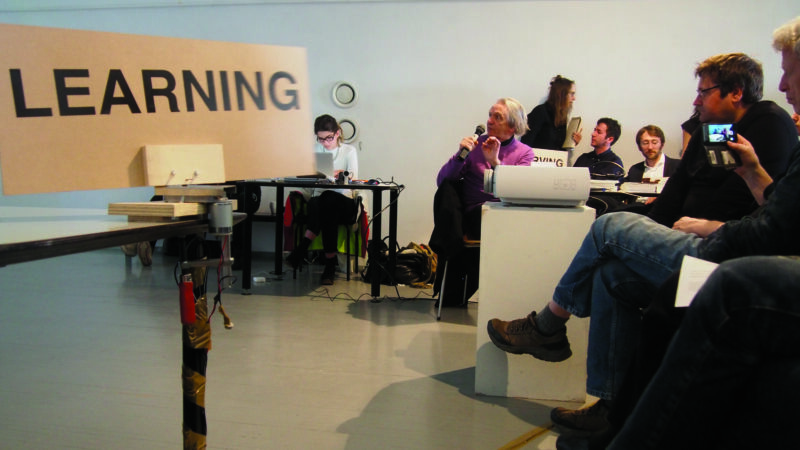13 Oct 2016
News
Polyphonic Discussion with Jacques Rancière

Photo by Polyphonic Discussion group
In Spring 2016, Rab-Rab journal (run by Grègoire Rousseau, a visual artist, and Sezgin Boynik, the chief editor and researcher) in collaboration with PhD in One Night (Ivana Momčilović, dramaturge), were involved in organising the course “Intervention on Equality and Aesthetics of Knowledge” that took place in Finnish Art Academy/University of the Arts. It was shared between Ivana Momčilović, Grègoire Rousseau, MA, BA, PhD , Post PhD students and free researchers from Helsinki Art Academies. This collective learning process, which concluded with the participation of Jacques Rancière, operated in two phases.
During the first two weeks, the participants met every day on academy premises to discuss and prolong an internal discussion on Rancière’s texts spanning art, knowledge, aesthetics, learning/un-learning process and class struggle. At the end of the course, the group hosted a long afternoon of open discussion and a seminar with Rancière on the aforementioned topics. The non-hierarchical structure of the learning process provided space for performance, video work, sculpture, experimental proposals and strong political stands as a translation came from theoretical texts and the poetic of knowledge of a single philosopher.
The following day, the group organised both an exhibition of the artworks produced during the workshop as well as a public discussion with external guests, which was related to educational issues involving Rancière’s “Ignorant Shool Master” method. This public encounter was hosted at Augusta Gallery at HIAP. A screening of Silvain Georges’ “Les éclats,” which Rancière selected, followed this public talk.
“Intervention on Equality and Aesthetics of Knowledge” attempted to build an academic discourse that does not aspire towards science but rather sensibility, and does not seek expertise but intuition (which Marx himself speaks about, especially in his letters). It built a completely new theoretical and emancipatory sensibility: a speech that does not belong to anyone in particular, but to everyone. This excessive unaccountability, within which Jacques Rancière is one of the voices, certainly becomes political. The poetics of knowledge, which he builds drifting among various “irreconcilable disciplines” (philosophy, history, politics, poetry), eludes both capitalist equivalence of inequality and the dogmatic Marxist (X worker = Y ignorance about his own situation).
Rancière’s “lesson” is primarily his style, which replaces the dull style of superiority, dogmatic objectivity, theoretical jargon, and takes in the vibrations and sounds of a certain time and era. This is the reason for Rancière’s lifelong commitment to forgotten workers’ archives. In “The Method of Equality,” as a recapitulation of his own “method”, he says: “I am not interested in whether Marx read workers’ brochures of his time that I used to read, but in how to accentuate that which Marx says through other voices, the voices of an era that essentially say the same, i.e. find that which is ‘common in thinking (…).’ The schism between ideology and science should, on the contrary, show that a scientist and an ignoramus do not say the same thing, because one speaks about the experienced, the empirical, while the other speaks about concepts. The world of concepts is an entirely autonomous world.”
The interventions made by the course participants and the intense discussions with Rancière were recorded. The participants of the course included: Flora Bouteille, Felipe de Avila, Walter Dewald, Inma Herrera, Minna Heikinaho, Yassin Khaled, Anni Laakso, Deniz Önlü, David Muoz and as well as Aleksi Kallio and Tuulikki Laes from Sibelius Academy/Artequal.
Text by Ivana Momčilović
